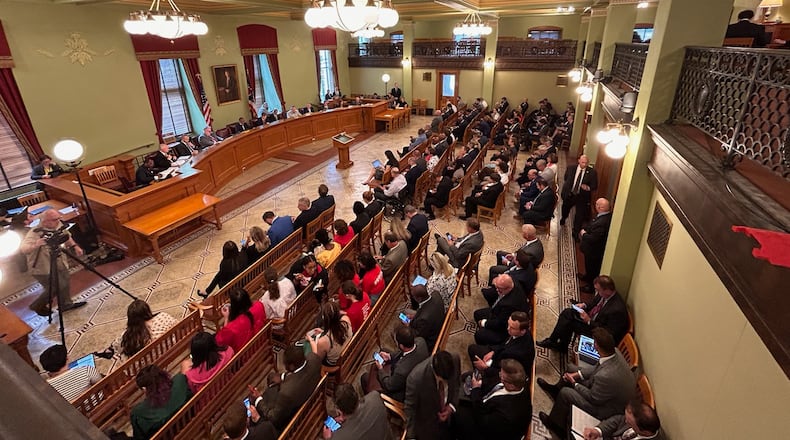However, a long series of amendments did see the Senate Finance Committee fold in unpopular legislation to regulate state college campuses; increase August special election funding from $15 million to $16 million; add video platforms to the Parental Notification Act; lower the minimum age to be a police officer from 21 to 18; allow charter schools to charge tuition above the voucher amount for students under 200% of the federal poverty level; and reverse the Senate’s hard-line stance against state tax incentives for housing, among other things.
Affordable housing
One of the Senate’s biggest revisions was to restore the new state housing tax credits proposed by Gov. Mike DeWine after having previously nixed them, a move that drew confusion from from affordable housing providers and industry advocates at the time.
“What we’re trying to do is recognize that there’s a need to keep people in their homes, there’s a need to provide for more single family housing, and in certain respects there’s need to provide multi-family (housing),” explained Senate Finance Chair Matt Dolan, R-Chagrin Falls. “This budget now provides for the availability for all three of those to develop in Ohio.”
On the whole, Wednesday’s amendments and the bill itself were opposed by the committee’s Democrats, who argued that the budget didn’t adequately address the needs for child care, infant mortality or SNAP benefits and raised concerns about the outsized relief income tax cuts will provide to wealthier Ohioans, the additional costs associated with universal school vouchers, and the inclusion of contentious legislation like Senate Bill 83 — a bill to regulate state colleges that has seen overwhelming disapproval from education stakeholders.
Childcare
The budget does not address concerns from advocates and the Ohio Chamber of Commerce about the Senate’s scaled-back funding approach to child care after both the House and the Senate each shaved off hundreds of millions of dollars from DeWine’s transformative proposal back in February.
At present, DeWine’s $150 million childcare scholarship program was abandoned by both chambers; his effort to increase access to subsidized childcare at a cost of over $200 million was almost entirely slashed by the Senate; and the House’s $30 million allocation to increase childcare capacity at existing childcare centers was cut in half.
While the Senate budget does broadly increase funding for child care programs in comparison to the current operating budget, industry advocate Lynanne Gutierrez of Groundwork Ohio said those marginal increases don’t keep up with higher costs. She characterized the Senate’s stance as a missed opportunity.
“The governor’s proposal was thoughtful and timely to help the childcare industry in the state survive the moment that we’re in — post pandemic with increased cost and increased need as we see jobs going unfilled,” Gutierrez said. “The Senate’s proposal completely walked backwards on that.”
Dolan told reporters that the Senate opted not to substantially increase access to child care while existing centers were struggling with capacity.
“It is having enough spots that is the problem right now that we have to address,” said Dolan, who noted that the Senate approved $15 million for that purpose — though the Senate’s proposal halves what the House approved.
Folded-in legislation
Senate Finance Democrats iterated their concerns with using the budget as a vehicle to pass legislation that hasn’t yet run due course in the Statehouse. Democrats cited Senate Bills 1, 21, 117 as “problematic,” but Sen. Kent Smith, D-Euclid, gave special attention to the budget’s inclusion of the overwhelmingly unpopular SB83.
The bill would block state professors from going on strike and prohibit mandatory diversity equity and inclusion programming, mandate “intellectual diversity” on college campuses and prohibit state universities from taking stances on any controversial belief or policies.
“(SB83 is) bad for education, bad for Ohio. It’s a threat to free thought, free speech, (and) free enterprise,” said Sen. Kent Smith, D-Euclid, who called the bill’s anti-strike provision “the worst attack on collective bargaining and unions that this chamber has seen” in over a decade.
Senate Finance Chair Matt Dolan, R-Chagrin Falls, said it was rolled into the budget to show that the legislation is a priority to his chamber. “I think it demonstrates the importance it (has) for the Senate to make sure that we hold the universities accountable,” Dolan said. A hearing hasn’t been held on SB83 in the House since May 14.
What’s next
Once the budget is passed by the Senate, the House will vote on whether it concurs on the changes. Disagreement is expected, which would move the budget to a conference committee where select Senators and Representatives will deliberate and decide a final proposal to be sent to DeWine, who has veto power over specific provisions.
“We look forward to a thorough discussion with the House and the administration on if there’s any other places to go,” Dolan said.
About the Author

